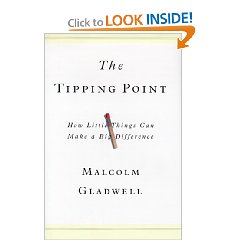For those aspiring to revolutionary change in any aspect of life (e.g. the Cultural Creatives), this book is a subtle revolutionary manifesto–at a more mundane level it is a sales guide. I like this book because as we all deal with the information explosion, it provides some important clues regarding what messages will “get through”, and what we need to do to increase the chances that our own important messages reach out to others.
This book is in some ways a modern version of Kuhn's “The Structure of Scientific Revolutions.” While more of a story than a thesis, there is a great deal here that tracks with some of the more advanced information theory dissertations, and the book could reasonably be subtitled “The Precipitants of Social Revolutions.”
The most subtle message in this book is that substance is not vital–perception is. The contagiousness of the idea, the life-altering potential of the smallest ideas, and the fact that revolutionary change is always cataclysmic rather than evolutionary, will frustrate those who think that years of intellectual exploration will be rewarded with acceptance.
However, despite the revolutionary nature of the final “tipping point”, there is actually a clear path taking up to 25 years, from the Innovators to the Early Adopters, to the Early Majority, to the Late Majority. My sense is that America today, with its 50 million Cultural Creatives, is about to cross over from the Early Adopters to the Early Majority stage, and will do so during the forthcoming Congressional elections when we see a rise in Independents and more attention to energy and other alternative sustainable lifestyle issues–hence, this book is relevant to anyone who either wants to promote a shift in America or elsewhere away from consumerism (or who wants to go on selling consumerism), or who wants to seriously revisit what many would call the failed strategies of the early environmentalist, human rights, and corporate accountability advocates.
The book ends on an irresistably upbeat note–change is posssible, people can radically transform their beliefs for the common good in the face of the right kind of impetus. Each of us has a role to play, whether as a Connector, a Maven, a Salesman, or a Buyer, and our role will not be defined in rational terms, but rather in social terms. In many ways, this book is about the restoration of community and the importance of relationships, and it is assuredly relevant to anyone who thinks about “the common good.”





